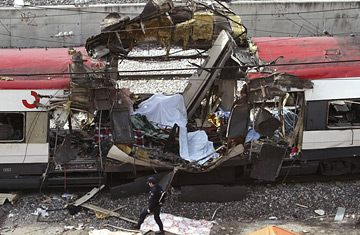
Prosecutors filed an appeal less than a week after Rabei Osman was aquitted of all charges in the 2004 Madrid bombing.
Not so fast. Less than a week after Spain's national court acquitted Rabei Osman of all charges in the 2004 Madrid train bombings in which 191 people were killed, prosecutors have appealed the sentence. On Tuesday, they filed their appeal, alleging that some of the grounds used to acquit Osman, who was charged, among other things, with being the "intellectual author," or mastermind, behind the train bombings, were faulty.
Prosecutors are not challenging Osman's acquittal for allegedly planning the attack. Rather, they question the judges' ruling on the charge that he belonged to a terrorist organization. Lead judge Javier Gómez Bermúdez, writing for the court, grounded that acquittal on the principle of non bis in idem, or double jeopardy, arguing that because Osman has already been convicted for membership in a terrorist organization by an Italian court, he cannot be found guilty for the same crime by the Spanish one.
Explaining the decision to appeal to the Spanish newspaper ABC, chief prosecutor Javier Zaragoza maintained that the two charges were not identical. "Different people were implicated, different criminal activities committed — the Italian conviction doesn't include all the activities of the group that developed in Spain," he said. According to Zaragoza's interpretation, Osman was involved with two separatist organizations, and can therefore be convicted separately for membership in each.
Much depends on how you define jihadist groups. "European penal law wouldn't recognize al-Qaeda as an organization," says Manuel Cancio, professor of criminal law at Madrid's Autonomous University. "It doesn't have hierarchical structure or leaders or clear lines of authority. So in this case, it's hard to say: are we talking about one organization or two?" Joan Queralt, professor of criminal law at the University of Barcelona, agrees. "The Mafia is the Mafia whether it commits a crime in Italy or in New York," he says. "But each jihadist group is distinct. We can't say that a cell in Madrid is part of the same organization as a cell in Milan."
Much also depends on how you define "firm." To be enacted, the principle of non bis in idem requires that the sentence in the first case be "firm" — that is, that it can no longer be appealed through normal judicial routes. In his sentence, Bermúdez referred twice to the firmness of the Italian conviction, justifying the acquittal in part on the assertion that the sentence that Osman received — 10 years in prison — could not be changed. However, two days before Bermúdez presented that verdict, an appeals court in Milan did just that, reducing Osman's sentence to eight years. And it turns out that Osman is mounting another appeal. Spanish prosecutor Olga Sánchez referred to this twist when she filed her request that the acquittal be revisited. "The decision of the Milan criminal court still hasn't acquired firmness," she wrote.
So what's going on here? "If the sentence is being appealed in Italy, then the [Spanish] court made a mistake," says Cancio. "This was a huge case, and an error might have slipped through." But Queralt believes Bermúdez was justified even if appeals were still going on. "Spain's Constitutional Court changed things a few years ago, ruling in one case that all appeals don't have to be exhausted," he says. "It's enough that the process is under way." Endika Zulueta, Osman's lawyer, sides with Queralt. In an e-mail, he writes, "I will contest the appeal because I think the law supports Rabei Osman's acquittal. Even if the sentence is written in such a way that could lead to a mistake, the principle of non bis in idem clearly applies to his case."
Firm? Not firm? One organization or two? It is now up to Spain's Supreme Court to work out the fine points over the next year or so. In the meantime, hostile debate of the Madrid bombings — who was involved; who blamed whom for what; should investigations carry on or not — continues to be the favorite sport of Spanish politicians. On Tuesday, the Congress of Deputies debated whether the opposition Popular Party had mounted a "media jihad" in its efforts to prove that ETA was indeed involved in the attacks. The uncertainty surrounding Osman's sentence will just give them one more thing to argue about.
